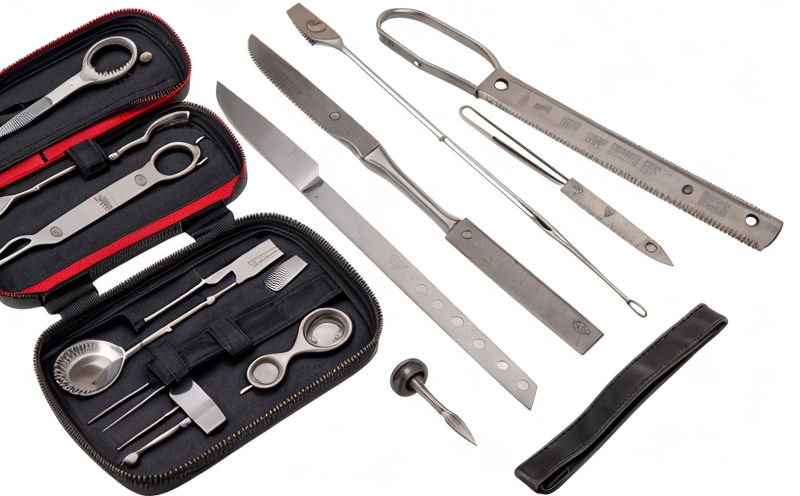Dimensional Accuracy Testing of Orthopedic Instruments
In the medical device industry, particularly within the realm of surgical instruments and tools, dimensional accuracy is paramount. Precision in manufacturing ensures that devices function as intended, providing optimal patient outcomes and reducing risks associated with improper fit or performance.
Orthopedic instruments are critical components used during surgeries to ensure successful procedures. From implants like hip and knee replacements to tools such as bone cutters and drills, these instruments must meet stringent dimensional accuracy standards. Any deviation could lead to surgical complications, patient discomfort, and even device failure.
Our lab specializes in conducting precise dimensional accuracy tests on orthopedic instruments using advanced metrology equipment and methodologies compliant with international standards such as ISO 13485, ASTM F739, and EN ISO 13485. These tests are crucial for ensuring that each instrument meets the exacting tolerances required by regulatory bodies.
The process involves several key steps. First, we receive the instruments from our clients, followed by thorough cleaning and preparation to ensure accurate measurement results. Next, we utilize state-of-the-art coordinate measuring machines (CMMs) capable of micron-level precision. This allows us to capture detailed 3D models of each instrument, providing comprehensive data on its dimensions.
Once the measurements are obtained, our team compares them against specified tolerances outlined in relevant standards. Any discrepancies are meticulously documented and reported back to our clients. For instruments requiring adjustments or rework, we provide detailed recommendations for manufacturers to correct any issues identified during testing.
The importance of this service cannot be overstated. It not only ensures compliance with regulatory requirements but also enhances product quality, thereby protecting both patients and healthcare providers from potential risks. By maintaining high levels of dimensional accuracy, we contribute significantly to the reliability and effectiveness of orthopedic surgical instruments.
Benefits
- Compliance with Regulations: Ensures adherence to international standards such as ISO, ASTM, EN, and IEC for dimensional accuracy in orthopedic instruments.
- Patient Safety: Reduces the risk of surgical complications due to improperly fitting or non-functional devices.
- Enhanced Product Quality: Guarantees that each instrument meets exacting tolerances, improving overall performance and reliability.
- Informed Decision-Making: Provides detailed reports and recommendations for manufacturers based on test results, aiding in continuous improvement of products.
Industry Applications
The testing of dimensional accuracy is particularly critical in the orthopedic sector where precision in surgical tools can mean the difference between success and failure. Our service supports various applications including:
- Hip and Knee Replacements: Ensuring that implants fit perfectly within the patient’s anatomy.
- Bone Cutting Tools: Guaranteeing that these instruments cut bone to precise dimensions, facilitating accurate surgical procedures.
- Osteotomy Devices: Providing exact measurements for tools used in corrective surgeries involving realignment of bones.
By offering this specialized service, we ensure that each instrument functions flawlessly during surgery, enhancing patient safety and satisfaction. This is especially vital given the complexity and critical nature of orthopedic procedures.
Customer Impact and Satisfaction
Our clients benefit greatly from our dimensional accuracy testing service through several avenues:
- Regulatory Compliance: Ensures that all orthopedic instruments meet the necessary regulatory standards, thereby avoiding potential legal issues.
- Improved Product Reliability: By identifying and addressing any dimensional inaccuracies early in the manufacturing process, we help prevent product failures and recalls.
- Enhanced Reputation: Consistent quality control translates to a positive reputation within the industry, fostering trust among clients and partners.
We also offer comprehensive training sessions for our clients’ teams, ensuring they understand how to interpret test results effectively. This support not only enhances their understanding but also empowers them to make informed decisions regarding product development and quality assurance.





